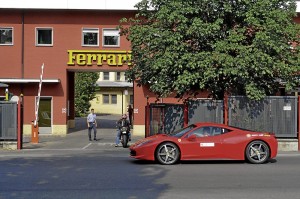In the company of (car) gods
MARANELLO, Italy—This northern town which has been the home base of Ferrari since 1943, is a study in contrast.
Still a few hours before arriving at the factory compound, the scene outside our shuttle bus window was just spectacular: large bales of hay in the foreground, mowed cornfields as far as the eye can see in one direction, and rows of cypress trees lining a road to a farmhouse in the other.
We felt as if we were part of an Italian countryside movie scene. And I couldn’t help contain my excitement knowing that at the far end of this road lies one of the world’s most technologically advanced automobile factories on the planet.
For me, this is Mount Olympus, the home of the gods who gave us some of the most coveted—if not the hardest to get—sports cars in the world.
The company’s founder, Enzo Ferrari, was forced to move here 69 years ago after his old workshop in the nearby city of Modena became one of the casualties of incessant bombings (it was the height of World War II).
Three years later, in 1947, the Maranello workshop rolled out the 1.5-liter, V12-powered 125 Sport, the first of many iconic sports cars that Ferrari was to create.
Leave cameras behind
Ferrari people are quite passionate—and secretive—about their work; a reason why we were asked to leave our digital cameras and mobile phones in the shuttle bus.
As we entered the factory’s Via Abetone Inferiore gate, I noticed something different. I was hoping to find a Ferrari in almost every employee’s parking space. There was none. Not even an ’80s Testarossa or a Mondial.
In fact, during the whole afternoon that we toured its more than 55-hectare facility I only glimpsed a handful of Ferraris: those that were still being assembled on the line (Californias and FFs) and those that were inside the Ferrari Classiche and Corse Clienti departments (where some of the most important Ferrari cars are kept and cared for).
The one that I did enjoy up close was the lone yellow 458 Italia displayed at the factory’s Atelier (this area is like a dressing room, where the Ferrari client, with the assistance of a team of experts, can completely personalize the car, right down to the stitching on the leather interior and the color of the brake callipers).
Not ordinary
Indeed, Ferrari is no ordinary car manufacturer and no product that came out of its Maranello plant is ordinary.
In fact, the Italian super-sports car giant delivered just over 6,500 units last year, a figure that would alarm any shareholder if not for the fact that Ferrari intentionally keeps production low (to ensure the brand’s exclusivity).
Besides, despite the fact that Ferraris are regarded as one of the world’s most expensive cars, the waiting lists remained notoriously long.
Realization
After the factory tour, I came to understand why.
As explained by our guide at the tour, every worker here signs off on the piece of work they execute, which means the employee takes full ownership of the task taken up and work delivered—much like how artists would sign their masterpieces.
Mike Evans, Shell’s Fuels Project leader for Ferrari, further explained that since 1997, Ferrari began an initiative (called Formula Uomo) that aims to provide its staff with the best possible working conditions.
“Ferrari’s aim was to develop an innovative factory by creating a well-organized, ecological environment that would continually stimulate and motivate those who work here,” Evans said (because factory tours are reserved for Ferrari clients and official sponsor, it was Shell that provided our group access).
The guide further explained that in order to achieve the best performance from employees, Ferrari renovated the whole complex that now combines carefully designed lighting systems, green areas (there are hundreds of trees along the roads around the factory), a new restaurant, climate control, noise damping, and special measures aimed at reducing environmental impact, with advanced technologies.
“You could acquire or develop the best component, build the most advanced car factory but you will still need the most passionate and content employees in order to create the world’s most desirable sports cars,” Evans admitted.

